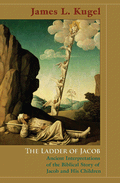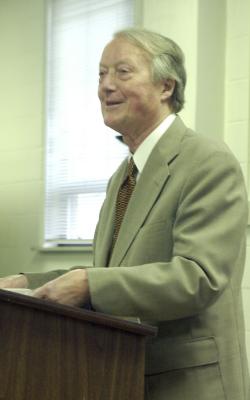 James Kugel’s new book, The Ladder of Jacob: Ancient Interpretations of the Biblical Story of Jacob and His Children (Princeton University Press, 2006; Buy from Amazon.ca | Buy from Amazon.com) is reviewed in today’s New York Sun.
James Kugel’s new book, The Ladder of Jacob: Ancient Interpretations of the Biblical Story of Jacob and His Children (Princeton University Press, 2006; Buy from Amazon.ca | Buy from Amazon.com) is reviewed in today’s New York Sun.
Here is an excerpt of the review:
This is Mr. Kugel’s 10th book on scriptural hermeneutics and perhaps his most fascinating; for here he takes on the appalling family of Jacob in all its mingled squalor and grandeur. As he puts it, “‘Dysfunctional’ is probably the first word an observer would use to describe such a family in modern times.” That seems an understatement. And yet, the five episodes he considers touch on virtually every aspect of the human predicament.
One interesting result of his approach is that we steadily see how differently earlier readers interpreted a text. Genesis 28 contains the famous dream-vision that Jacob had on the way to Haran: “He had a dream; a ladder was stuck into the ground and its top reached up to heaven, and the angels of God were going up and down on it. And the Lord was standing over him and He said, ‘I am the Lord, the God of Abraham your father and the God of Isaac; the land upon which you are lying I am giving to you and your descendants.” This passage had never struck me as problematic. But it bothered ancient readers. What was the point of the ladder? Couldn’t God have spoken directly to Jacob? And why, after he heard the voice of the Lord, did Jacob grow frightened and say, “How fearsome is this place!” Wasn’t God’s message with its promise of covenant reassuring?
The ladder itself called forth highly creative speculation. For Philo it represented the “ups and downs” of human experience. Others were intrigued by the statement that the angels were “going up and down” on it. If they were going up, they must have begun from the ground. What were the angels doing on the ground in the first place? Some suggested that they had been on a previous mission; but if so, why had they stayed so long before ascending again? One puzzle bred others. The text was a mere seed, the commentaries that sprouted from it a vast bramble that somehow, over centuries, came to cohere.
….
Whether discussing Reuben’s sin with Bilhah or the priesthood of Levi or Judah and Tamar, Mr. Kugel moves easily from moral dilemmas to textual enigmas; his book thus serves as a guide to interpretation as well. He analyzes motifs and explains such hermeneutic devices as “notariqon,” a method for explaining ambiguous words by breaking them down into their hidden components (as if we would gloss the word “hearth” by saying that it was composed of “heart” and “earth”). As he notes, exegesis itself became a kind of Jacob’s ladder over the centuries, with rungs capable of spanning the lowest and the highest in one swoop. His own book has that laddered quality. Maybe the point isn’t to reach the top of the ladder but to keep that angelic procession going up and going down to the end of time.
Here is an outline of the chapters from the publisher’s website:
- Chapter One: Jacob and the Bible’s Ancient Interpreters
- Chapter Two: The Ladder of Jacob
- Chapter Three: The Rape of Dinah, and Simeon and Levi’s Revenge
- Chapter Four: Reuben’s Sin with Bilhah
- Chapter Five: How Levi Came to Be a Priest
- Chapter Six: Judah and the Trial of Tamar
- Chapter Seven: A Prayer about Jacob and Israel from the Dead Sea Scrolls
The book looks quite facinating — so much so I may adopt it for my Genesis course next semester (any other suggestions are welcome!).
Interestingly, the front cover is almost identical to another great book on the Jacob narrative: Frederick Beuchner’s The Son of Laughter: A Novel (HarperSanFrancisco, 1994; Buy from Amazon.ca | Buy from Amazon.com).
(HT PaleoJudaica)

 James Kugel’s new book, The Ladder of Jacob: Ancient Interpretations of the Biblical Story of Jacob and His Children (Princeton University Press, 2006;
James Kugel’s new book, The Ladder of Jacob: Ancient Interpretations of the Biblical Story of Jacob and His Children (Princeton University Press, 2006;  Dr. James Barr, an amazing biblical scholar, theologian, and linguist, died October 14 in Claremont, California. Students of the Hebrew Bible/Old Testament will be familiar with his works (if not, they should be!). Here is an excerpt from the Vanderbilt
Dr. James Barr, an amazing biblical scholar, theologian, and linguist, died October 14 in Claremont, California. Students of the Hebrew Bible/Old Testament will be familiar with his works (if not, they should be!). Here is an excerpt from the Vanderbilt